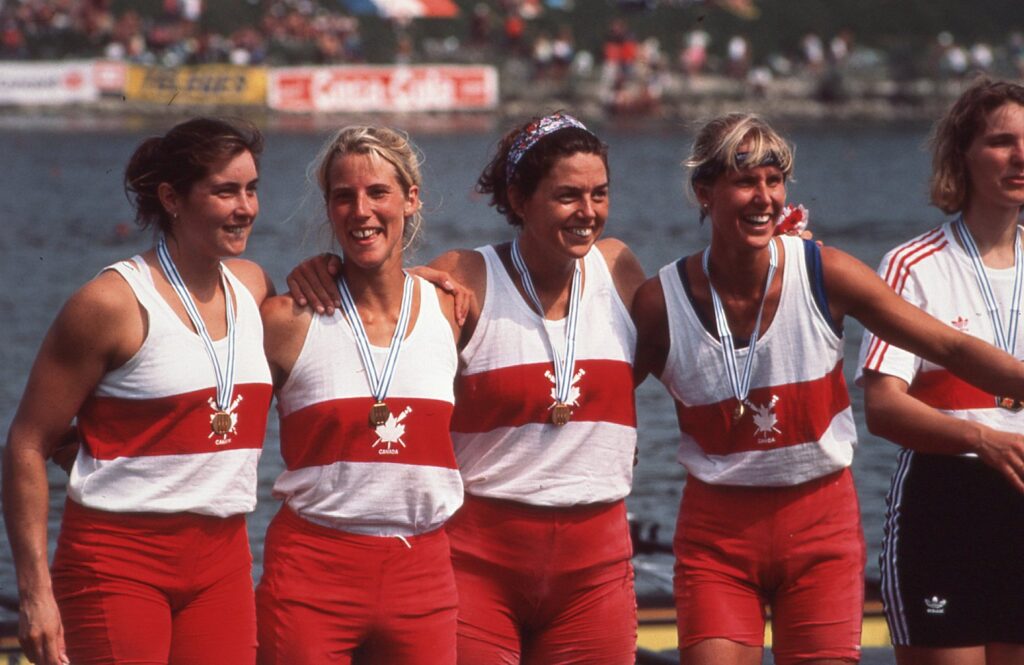
25 Apr 2023
Going green: Brenda Taylor's switch to electric
In an age of climate change, many say that the future is electric. Yet, even as electric devices are now commonplace within the sport of rowing—think speed/stroke/heart rate monitors, megaphones, radios, video cameras, cell phones—one nearly essential thing has stubbornly resisted the shift to electric: the coaches’ motorboat engine. Whether you call it a coach boat, a safety boat, a launch, a catamaran, a dingy, or something else, the support boats that make it possible for rowers to train and race are almost always powered by fossil fuels.
While the goal of “going electric” has never really been more than a dream in the past, the revolution in battery technology currently powering a rapid rise in electric vehicles gives some, like Canada’s Brenda Taylor, hope that things are about to change in rowing. The former Olympian and long-time rowing coach and boathouse manager spoke to World Rowing from her home in British Columbia (BC), about an upcoming pilot project, facilitated by the provincial rowing association, Rowing BC, and exploring the viability of switching from fossil fuels to electric.
“We are testing six electric outboard engines from a few different brands,” says Taylor of the pilot set to begin this summer at multiple clubs in Canada’s westernmost province. “They are equivalent to existing gas [petrol] outboards at these clubs so they can be compared, and these are being tested on three different types of launches.”
The project will collect data and measure a range of more obvious metrics like fuel/battery efficiency as well as others that might not seem so obvious to anyone unfamiliar with the sport like noise. “People who have coached for a long time can end up with hearing loss,” says Taylor, emphasising the difference between gas and electric. “One coach we heard from, at a club with an electric motor said that she didn’t even need a megaphone.”
Changing the narrative
Along with all the data collection aspect of the pilot project, one thing that will be key to more rowing clubs switching to electric motors, according to Taylor, is communicating their results and showing people that this is a viable option.

“The biggest predictor of whether someone will have solar panels on their house is living near someone else who already has them on their house,” says Taylor, drawing a comparison with another “green” technology. “We want to create a community feel so that people can ask questions and get those questions answered. We see how important this has been in people adopting electric vehicles. Once you try an electric vehicle, you don’t want to go back to a gas one.”
As for what has held people back from making the switch before now, the cost has been a big factor says Taylor. “Electric motors are still more expensive than gas outboards, just like electric cars have been until recently,” she says. Also, the large, heavy batteries of the past that delivered a relatively small charge to low-power engines that have not been up to the job of powering a coaching boat the way that a 15 or 25 horse power gas outboard can do.
“Electric outboards have been around for a long time,” says Taylor, “One of the manufacturers we are looking at has been around for over 100 years. Different people have rigged up slightly bigger outboards, but the big issue has been the battery size. The advances in battery technology make the electric outboards more powerful now and more practical.”
“Also,” she adds, “everyone realizes as a world, we need to electrify. We need to get off of fossil fuels, including many outboard motor companies. Some companies are brand new, developing electric outboards form the ground up. And there are also gas engine companies that are also moving into electric.
“We have to chance. There is no argument anymore, climate change is happening. The warnings are getting more dire. We have to hit the IPCC targets,” she says of the United Nation’s intergovernmental climate group’s goals to reduce greenhouse gas emissions globally. “That means everyone has to do it. This affects everybody, sport and rowing too. We have to do our part. It is a transition that is happening. It has to happen. We had better get ahead of the wave and ride it rather than be smashed by it.”
Sharing resources and stories of success
As for the project’s ultimate aim: “I hope we can demonstrate the business case and the rationale for making the switch from gas to electric,” says Taylor. “The deliverable will be some kind of resource that clubs can use in their decision making. I was manager of a club for 12 years and I know people don’t have the capacity to do the research themselves.”
“There are a lot of questions with no clear answers at the early adoption phase of a new technology,” Taylor says. “Early adopters don’t know the pros and cons. This is one of the reasons we want to do the pilot, to take on some of the risk, answer some of the questions and reduce some of the uncertainties that people have.”
“I hope that this will convince clubs in BC and elsewhere to start making the switch,” she adds, pointing out the importance of having data for securing funding to pay for any major equipment upgrades. “I hope the resource will also help clubs in applying for grants.”
Beyond making the business case for the switch to electric in British Columbia, also home to Canada’s national team training centre, the project plans to share their findings with the wider rowing community. “This project may be in BC, but we are hoping to share the information across Canada and around the world, Taylor says. “I would love for there to be a pilot at the international level.”

